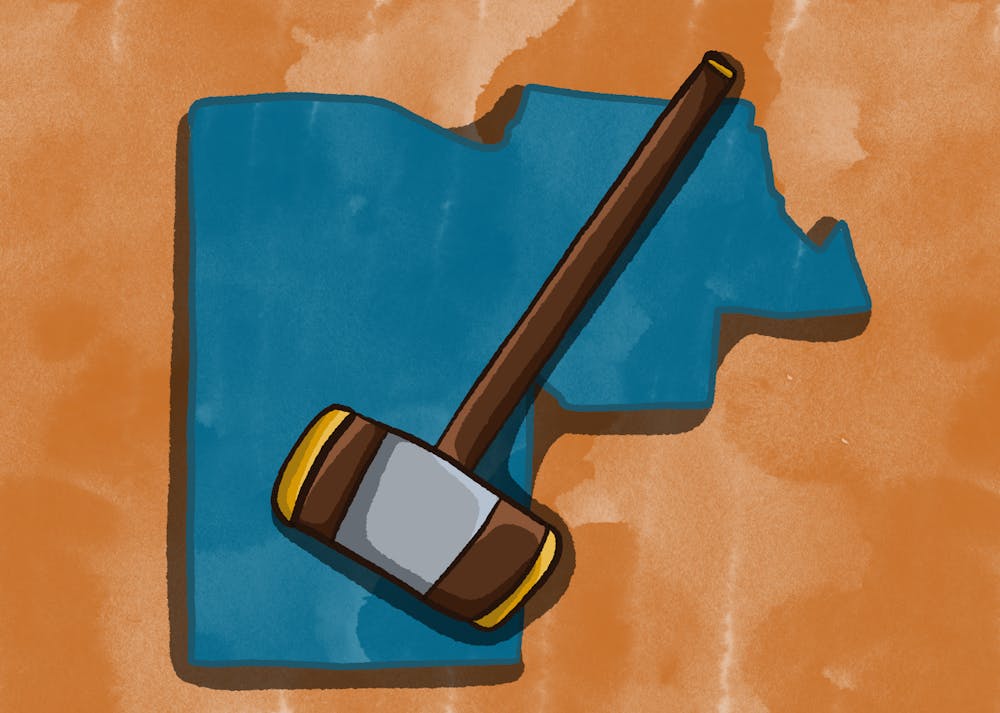The upcoming Maricopa County Attorney election puts the enforcement of Arizona's new abortion law on the ballot, according to experts and candidates.
The Maricopa County Attorney's office prosecutes all felonies that occur within Maricopa County and all misdemeanors in incorporated areas. It also serves as legal counsel for all county government officials and departments. It is the third largest prosecutorial agency in the U.S., according to its website.
This year's election is between incumbent Republican Maricopa County Attorney Rachel Mitchell and Democrat Julie Gunnigle. Gunnigle, who ran unsuccessfully for the office in 2020, has taken an abortion rights stance since last week's Pima County Court ruling, which allows a territorial Arizona law from 1864 to ban abortion in all cases except when the parent's life is in danger.
Some have told Gunnigle they are happy she has a new platform to campaign on, but she said she is not happy with that rhetoric.
"People have been calling me and they're like, 'Congratulations, Julie, this 1864 law really will help you in your election,'" Gunnigle said. "I actually got incredibly angry."
However, some students, including Anna Villard, a sophomore studying sociology, said the ruling should be a catalyst for more students to vote.
"It honestly was not that surprising, which is really sad," Villard said. "I hope that this kind of wakes up people in a sense that this is actually something serious that will have a direct effect on us."
Mitchell is best known for her role as the lead Republican counsel in Supreme Court Justice Brett Kavanaugh's special hearings before he was confirmed and appointed in 2018. She took over after former county attorney Allister Adel resigned in March.
In a statement, Mitchell said she won't prosecute women for having an abortion, and called claims that she will "irresponsible." However, the territorial law targets providers, and Mitchell's stance on prosecuting providers of abortions remains unclear.
READ MORE: Pima County ruling allows enforcement of near-total abortion ban
Abortion is all over the Arizona ballot this year. Besides the Maricopa County Attorney, the U.S. Senate and gubernatorial races are between two candidates who either support abortion or want to ban it.
In a letter to Gov. Doug Ducey last week, Attorney General Mark Brnovich's office asked the governor to call a special session of the Legislature to clarify Arizona's abortion law after the governor's office said a previous 15-week ban would still take effect despite the court's ruling on Sept. 23.
Planned Parenthood Arizona filed a motion for an immediate stay of the ruling last week in order to give lawmakers and abortion providers time to come to a consensus on the laws. That motion was denied on Friday.
Dave Wells, an ASU lecturer who teaches political science, said Maricopa County Attorney is one of the most important races to think about when considering abortion rights.
"It's within the discretion of a county attorney as to what crimes they'll choose to prosecute or pursue different things," Wells said. "In that context, people have different views on abortion and might want to use that as a primary way in which to discern between the two candidates."
Gunnigle said this is a crucial race for students to pay attention to and vote on because abortion is an issue that impacts students directly.
"The county attorney is now the most important person in all of our reproductive lives, and I think that that's pretty huge for anybody who has a uterus and cares about freedom," Gunnigle said.
Gunnigle has worked with students throughout her campaign. Jackson Rubin, a freshman studying economics, who has been knocking on doors and canvassing for Gunnigle said she has been passionate about protecting abortion rights. He also thinks this is a critical issue for students to vote on.
"I think it's important for college students especially to pay attention to this issue in this race because it affects women, young girls and young people throughout the county," Rubin said.
Villard said this specific election could determine how students would have to approach their own reproductive health.
"It's a matter of not having to drive to California if you want an abortion," Villard said. "The revival of the ban is kind of just giving us a sneak peek into what's going to continue to happen."
Gunnigle said she understands some people are tired of being told to vote and said she thinks her generation failed to uphold certain rights for the younger generation and is relying on them for a way out. But, she said, voting is one of the best actions for a student to take in this election.
"Nevertheless, as someone who is on the ballot and understands the power that this office has, I'm not sure there's a solution other than a political one," Gunnigle said.
Edited by Reagan Priest, Wyatt Myskow and Piper Hansen.
Reach the reporter at sbrenna5@asu.edu and @shanebrennan36 on Twitter.
Like The State Press on Facebook and follow @statepress on Twitter.

Shane Brennan is the former Editor-in-Chief at The State Press and an ASU alum. He was a sports and politics reporter, before becoming the editor of the politics desk. He has covered local and state politics for the Arizona Capitol Times and Cronkite News.




